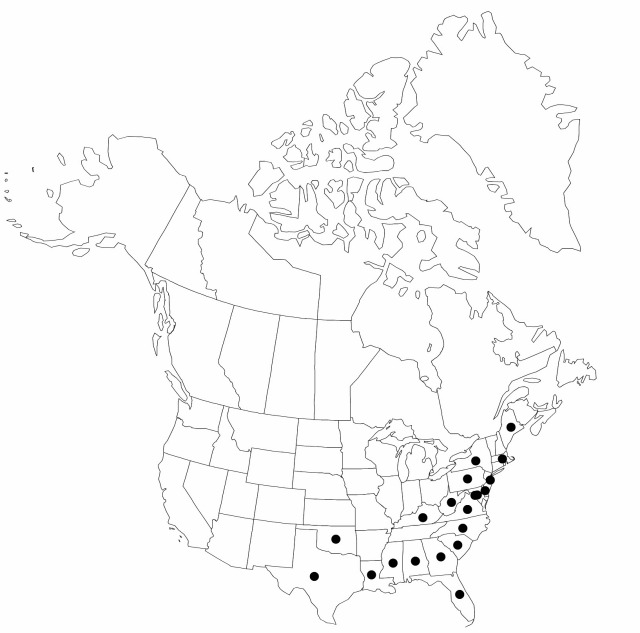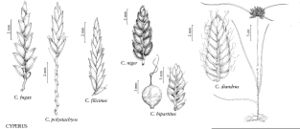Difference between revisions of "Cyperus polystachyos"
Descr. Pl. Rar., 21. 1772.
imported>Volume Importer |
imported>Volume Importer |
||
| Line 68: | Line 68: | ||
|publication year=1772 | |publication year=1772 | ||
|special status=W2;W1;Illustrated | |special status=W2;W1;Illustrated | ||
| − | |source xml=https:// | + | |source xml=https://bitbucket.org/aafc-mbb/fna-data-curation/src/2e0870ddd59836b60bcf96646a41e87ea5a5943a/coarse_grained_fna_xml/V23/V23_252.xml |
|genus=Cyperus | |genus=Cyperus | ||
|subgenus=Cyperus subg. Pycreus | |subgenus=Cyperus subg. Pycreus | ||
Latest revision as of 20:39, 5 November 2020
Herbs, perennial (annual?), cespitose. Culms trigonous or ± terete, (3–)20–45(–70) cm × (0.8–) 1.2–2 mm, glabrous. Leaves (2–) 6–10(–16), flat to V-shaped, (2–) 10–30(–60) cm × 1–4 mm. Inflorescences: spike 1, loosely ovoid to densely turbinate, 12–40 × 10–25 mm; rachis 3–10 mm; rays 1–8(–12), 0.5–3(–6) cm; 2d order rays absent; if rays absent, inflorescence single dense cluster of spikelets, 12–40 mm diam.; bracts (3–)4–6(–7), horizontal to ascending at 45°, flanged V-shaped, (2–)5–15(–23) cm × 1–4 mm. Spikelets (5–)15–30(–40), spreading to appressed-ascending, linear-lanceoloid to linear, compressed, 8–18(–40) × (1–)1.3–1.6(–2) mm; floral scales (8–)12–25(–66), laterally stramineous to light brown, medially green, laterally ribless, medially 3–5-ribbed, oblong, (1.5–)1.8–2.4 × (1–)1.2–1.4 mm, apex acute to ± acute, mucronate. Flowers: stamens 2; anthers (0.4–)0.5–0.8 mm, connective not prolonged; styles 0.6–1(–1.4) mm; stigmas (1–)1.4–2 mm. Achenes light to dark brown, oblong, (0.8–)0.9–1.1(–1.2) × 0.4–0.5(–0.6) mm, base cuneate to ± stipelike, apex truncate, apiculate, surfaces punctate to minutely punctate with raised cells.
Phenology: Fruiting summer–early fall.
Habitat: Shores, ditches, swales between dunes
Elevation: 0–200 m
Distribution

Ala., Del., D.C., Fla., Ga., Ky., La., Maine, Md., Mass., Miss., N.J., N.Y., N.C., Okla., Pa., S.C., Tex., Va., W.Va., Mexico, Central America, South America, Asia, Africa.
Discussion
Cyperus polystachyos is polymorphic. Adequate understanding of the infraspecific variations of C. polystachyos requires a worldwide examination, which is beyond the scope of this study. The segregates, C. fugax and C. filicinus, are recognized here; they have been usually accepted by recent workers (e.g., M. L. Fernald 1950; H. A. Gleason and A. Cronquist 1991).
Selected References
None.
